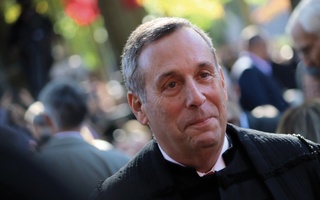{shortcode-be623e3db938a8ed1444648d4ad342bb9c831f95}Dean of the Faculty of Arts and Sciences Claudine Gay said in an interview Wednesday that she is currently reviewing proposed changes to federal Title IX policy and would be “concerned” about any alterations that make it more difficult for people who have experienced sexual misconduct to report it.
The proposed regulations — released last month alongside a statement from U.S. Education Secretary Betsy DeVos — provide a new framework for interpreting Title IX, an anti-sex discrimination law that shapes the way universities address sexual harassment.
Under the new proposed rules — which could take effect in 2019 following a notice-and-comment period — universities would choose what standard of evidence to apply to cases of sexual misconduct, complainants and respondents of formal investigations would have the opportunity to question each other in a live hearing, and complaints of misconduct could not center on incidents that take place outside the bounds of a school “program or activity.”
Gay said she is still reviewing the proposed rules and that any changes that make it more difficult for people to come forward with allegations of sexual misconduct will be “of concern” to her.
“One of the things that I've come to recognize is how difficult it is for people who feel like they've experienced sexual and gender-based harassment or discrimination to come forward, and tell their stories and to seek help,” Gay said. “Any kind of guidelines that would make that even more difficult are reasons to pause.”
Gay said she will also remain wary of any changes that “pull Title IX away from its civil rights context.” She said revisions that apply a “criminal procedures framework” to Title IX are “not appropriate.”
“Understanding that this is a civil rights issue is something that really we can't lose sight of frankly not just as a university but as a society — that this is what it means for every single person, especially for the women, to be able to participate equally and fully in society, that they need to be able to do that without fear or the distraction of harassment or discrimination,” Gay said.
Though Gay recognized Title IX policies are different across universities, she said “understanding of Title IX in the civil rights context is something that seems to be common.”
University President Lawrence S. Bacow addressed DeVos’s proposed changes and a University report reviewing current Title IX policies in an email to Harvard affiliates Thursday. Gay followed Bacow’s statement with an email of her own, highlighting three of her priorities in considering FAS policy.
One of the issues, Gay wrote, is the need for “good data.” Gay wrote she supports the Title IX Policy Review Committee’s recommendation to be more transparent in how investigations are conducted. Gay also addressed the “power imbalance” of the academic institution.
“The particular role of tenured faculty in assessing academic and other work can make other members of the community more vulnerable to harassment and more reluctant to report for fear of negative professional or academic repercussions,” Gay wrote. “To my tenured faculty colleagues, I would say that this reality means that we have a particular responsibility to speak up and to drive the changes we want to see in this institution.”
The new proposed Title IX rules must remain open for 60 days to receive feedback from the public. After the 60-day notice-and-comment period ends, the Department of Education must wait approximately three months before officially changing federal policy.
With the comment period underway, students at the College, Harvard Law School, and Harvard Kennedy School have already begun mobilizing against the proposed changes.
Gay said it remains unclear whether FAS will need to modify its policies in response to the proposed regulations. For now, FAS policies will remain the same, she said.
“It could actually be awhile before there’s any guidance, and then we need to decide whether or not the guidance has any implications that requires us to change anything about what we're doing,” Gay said. “It could be that at the end of the day we're in large part in compliance with the guidelines. It's just hard to say at this point so we're in status quo currently.”
—Staff writer Angela N. Fu can be reached at angela.fu@thecrimson.com. Follow her on Twitter @angelanfu.
—Staff writer Lucy Wang can be reached at lucy.wang@thecrimson.com. Follow her on Twitter @lucyyloo22.
Read more in News
Harvard Law School Pipeline Parity Project Celebrates Another Change to Controversial Law Firm PoliciesRecommended Articles
-
 New FAS Dean Gay Recruiting Faculty Who Study Race, Ethnicity
New FAS Dean Gay Recruiting Faculty Who Study Race, Ethnicity -
 Harvard Still Facing Three Federal Probes Into Its Compliance With Title IX
Harvard Still Facing Three Federal Probes Into Its Compliance With Title IX -
 Harvard Pursuing a Second Title IX Investigation Into Economics Prof Fryer
Harvard Pursuing a Second Title IX Investigation Into Economics Prof Fryer -
 In Wake of #MeToo, Harvard Title IX Office Saw 56 Percent Increase in Disclosures in 2018, Per Annual Report
In Wake of #MeToo, Harvard Title IX Office Saw 56 Percent Increase in Disclosures in 2018, Per Annual Report -
 Harvard President Bacow Opposes Provisions of DeVos’s Proposed Title IX Rules
Harvard President Bacow Opposes Provisions of DeVos’s Proposed Title IX Rules













